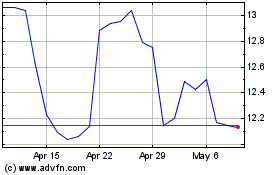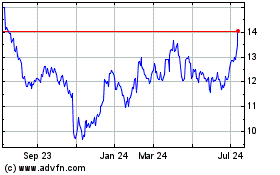By Mike Colias and Nina Trentmann
This article is being republished as part of our daily
reproduction of WSJ.com articles that also appeared in the U.S.
print edition of The Wall Street Journal (March 22, 2019).
Ford Motor Co. has tapped an Amazon.com Inc. veteran as its new
chief financial officer, reflecting a broader transformation at the
116-year-old auto maker as it tries to compete with Silicon Valley
on new transportation technologies.
Tim Stone, who was previously CFO of Snap Inc. and before that
at Amazon for 20 years, will succeed Bob Shanks effective June 1,
Ford said Thursday. Mr. Shanks, who had been with Ford for more
than four decades, will retire at the end of the year. He had been
CFO since 2012.
Mr. Stone, 52 years old, will join Ford April 15 initially as an
officer. Mr. Shanks, 66, will work closely with Mr. Stone on the
CFO transition and then work on special projects through the end of
the year, Ford said.
"Bob's leadership was integral to Ford's comeback during the
great recession, and he has been an invaluable partner as we
transform Ford to succeed in the next era," Ford Chief Executive
Jim Hackett said in prepared remarks.
During his tenure at Amazon, Mr. Stone led the finance function
for the Kindle and other devices, digital content, and Amazon Web
Services, among others, according to a statement provided by Ford
from Tom Szkutak, Amazon's CFO from 2002 to 2015 and Mr. Stone's
former boss.
In January, Snap said Mr. Stone was leaving the social-media
company after less than a year on the job, and that he would stay
on to help with the transition. His short tenure at the parent
company of messaging app Snapchat was marked by executive turnover
and share pressure as the company struggled to maintain user
growth.
Ford recently has been under pressure after a string of
quarterly results and profit forecasts that disappointed Wall
Street. Mr. Hackett has embarked on a turnaround plan that includes
slashing costs and redesigning the business to speed up vehicle
development while reducing capital spending. He also wants to
transform Ford's operations to better position it for a future
where executives see technology giving consumers more alternatives
to owning or driving a personal vehicle. Ford has invested in new
micro-mobility ventures, such as buying an electric-scooter startup
last year.
Some analysts have expressed frustration about the pace of his
progress and have pressed him for more specifics about his plans to
revive the business.
Ford recently began an $11 billion, multiyear restructuring that
will include thousands of layoffs, mainly in overseas operations
including Europe and South America. The No. 2 U.S. auto maker lost
money in all its foreign regions last year, leaving its strong
pickup-truck and SUV business in the U.S. to carry its bottom
line.
Mr. Shanks has spent recent months trying to assure analysts and
investors that the company will be able to maintain its
investment-grade rating and preserve its dividend. Ratings firms
have raised concerns about whether the turnaround efforts can
produce results quickly enough to stave off a ratings
downgrade.
Ford's operating profit fell 27% last year, to $7 billion, while
its operating cash flow sank by about one-third, to $2.8 billion.
Mr. Shanks said in January that Ford's balance sheet is solid and
results should improve this year barring worse-than-expected impact
from commodity costs, trade policy and other variables.
Mr. Stone's appointment is slightly out of character for both
Ford and the broader auto industry that typically looks to lifelong
insiders to promote to these roles, said Rich Kolpasky, head of the
automotive practice at recruiter Stanton Chase. "This appointment
is an unusual step for Ford. My first reaction was a little bit of
surprise."
Moves like the appointment of Mr. Stone will, however, become
more frequent as auto companies adjust to technological changes and
to changing consumer behavior, Mr. Kolpasky said. "This appointment
of an industry outsider coming to Ford with a high-tech background
is just the beginning in the car industry. There will be many more
of these executives to join the automotive industry."
The appointment could accelerate Ford's transformation from a
traditional auto maker to a mobility provider, Mr. Kolpasky said,
adding that Mr. Stone's experience at Amazon would be helpful in
this regard. "At Amazon, Tim saw the business model change in a way
that most companies have never seen. I think that is very relevant
to where the auto industry is at the moment," Mr. Kolpasky
said.
Mr. Stone's experience at once-nascent businesses -- as CFO of
Amazon Web Services, now one of the fastest-growing parts of the
web giant, for example -- will be useful at Ford, as the auto maker
looks to grow its mobility business. "He seems to be bringing the
right tools for Ford as it embarks on a tremendous transformation,"
said David Whiston, an analyst at Morningstar Inc.
A company outsider, Mr. Stone will have to strike a careful
balance between driving change while also integrating into a
company as traditional as Ford, said Mr. Whiston. "Bob Shanks was
one of the public faces of Ford and wielded power not just in the
finance function," Mr. Whiston said. "It will be interesting to see
whether Mr. Stone will do that, too."
Aisha Al-Muslim contributed to this article.
Write to Mike Colias at Mike.Colias@wsj.com and Nina Trentmann
at Nina.Trentmann@wsj.com
(END) Dow Jones Newswires
March 22, 2019 02:47 ET (06:47 GMT)
Copyright (c) 2019 Dow Jones & Company, Inc.
Ford Motor (NYSE:F)
Historical Stock Chart
From Mar 2024 to Apr 2024

Ford Motor (NYSE:F)
Historical Stock Chart
From Apr 2023 to Apr 2024
